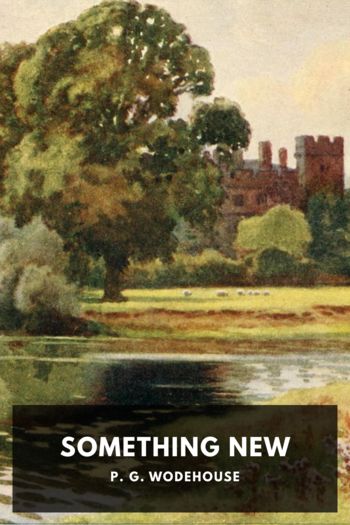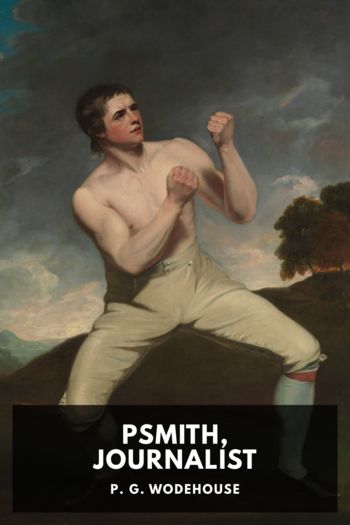Leave It to Psmith - P. G. Wodehouse (i wanna iguana read aloud .TXT) 📗

- Author: P. G. Wodehouse
Book online «Leave It to Psmith - P. G. Wodehouse (i wanna iguana read aloud .TXT) 📗». Author P. G. Wodehouse
“I think you must be mad,” said Lady Constance bitterly, resuming her remarks and starting at the point where she had begun before.
“Baxter’s mad,” retorted his lordship, also retreading old ground.
“You are too absurd!”
“He threw flowerpots at me.”
“Do please stop talking about those flowerpots. Mr. Baxter has explained the whole thing to me, and surely even you can see that his behaviour was perfectly excusable.”
“I don’t like the fellow,” cried Lord Emsworth, once more retreating to his last line of trenches—the one line from which all Lady Constance’s eloquence had been unable to dislodge him.
There was a silence, as there had been a short while before when the discussion had reached this same point.
“You will be helpless without him,” said Lady Constance.
“Nothing of the kind,” said his lordship.
“You know you will. Where will you ever get another secretary capable of looking after everything like Mr. Baxter? You know you are a perfect child, and unless you have someone whom you can trust to manage your affairs I cannot see what will happen.”
Lord Emsworth made no reply. He merely gazed wanly from the window.
“Chaos,” moaned Lady Constance.
His lordship remained mute, but now there was a gleam of something approaching pleasure in his pale eyes; for at this moment a car rounded the corner of the house from the direction of the stables and stood purring at the door. There was a trunk on the car and a suitcase. And almost simultaneously the Efficient Baxter entered the library, clothed and spatted for travel.
“I have come to say goodbye, Lady Constance,” said Baxter coldly and precisely, flashing at his late employer through his spectacles a look of stern reproach. “The car which is taking me to the station is at the door.”
“Oh, Mr. Baxter.” Lady Constance, strong woman though she was, fluttered with distress. “Oh, Mr. Baxter.”
“Goodbye.” He gripped her hand in brief farewell and directed his spectacles for another tense instant upon the sagging figure at the window. “Goodbye, Lord Emsworth.”
“Eh? What? Oh! Ah, yes. Goodbye, my dear fel—, I mean, goodbye. I—er—hope you will have a pleasant journey.”
“Thank you,” said Baxter.
“But, Mr. Baxter,” said Lady Constance.
“Lord Emsworth,” said the ex-secretary icily, “I am no longer in your employment …”
“But, Mr. Baxter,” moaned Lady Constance, “surely … even now … misunderstanding … talk it all over quietly …”
Lord Emsworth started violently.
“Here!” he protested, in much the same manner as that in which the recent Mr. Cootes had been wont to say “Hey!”
“I fear it is too late,” said Baxter, to his infinite relief, “to talk things over. My arrangements are already made and cannot be altered. Ever since I came here to work for Lord Emsworth, my former employer—an American millionaire named Jevons—has been making me flattering offers to return to him. Until now a mistaken sense of loyalty has kept me from accepting these offers, but this morning I telegraphed to Mr. Jevons to say that I was at liberty and could join him at once. It is too late now to cancel this promise.”
“Quite, quite, oh certainly, quite, mustn’t dream of it, my dear fellow. No, no, no, indeed no,” said Lord Emsworth with an effervescent cordiality which struck both his hearers as in the most dubious taste.
Baxter merely stiffened haughtily, but Lady Constance was so poignantly affected by the words and the joyous tone in which they were uttered that she could endure her brother’s loathly society no longer. Shaking Baxter’s hand once more and gazing stonily for a moment at the worm by the window, she left the room.
For some seconds after she had gone, there was silence—a silence which Lord Emsworth found embarrassing. He turned to the window again and took in with one wistful glance the roses, the pinks, the pansies, the carnations, the hollyhocks, the columbines, the larkspurs, the London pride and the Canterbury bells. And then suddenly there came to him the realisation that with Lady Constance gone there no longer existed any reason why he should stay cooped up in this stuffy library on the finest morning that had ever been sent to gladden the heart of man. He shivered ecstatically from the top of his bald head to the soles of his roomy shoes, and, bounding gleefully from the window, started to amble across the room.
“Lord Emsworth!”
His lordship halted. His was a one-track mind, capable of accommodating only one thought at a time—if that, and he had almost forgotten that Baxter was still there. He eyed his late secretary peevishly.
“Yes, yes? Is there anything … ?”
“I should like to speak to you for a moment.”
“I have a most important conference with McAllister …”
“I will not detain you long. Lord Emsworth, I am no longer in your employment, but I think it my duty to say before I go …”
“No, no, my dear fellow, I quite understand. Quite, quite, quite. Constance has been going over all that. I know what you are trying to say. That matter of the flowerpots. Please do not apologise. It is quite all right. I was startled at the time, I own, but no doubt you had excellent motives. Let us forget the whole affair.”
Baxter ground an impatient heel into the carpet.
“I had no intention of referring to the matter to which you allude,” he said. “I merely wished …”
“Yes, yes, of course.” A vagrant breeze floated in at the window, languid with summer scents, and Lord Emsworth, sniffing, shuffled restlessly. “Of course, of course, of course. Some other time, eh? Yes, yes, that will be capital. Capital, capital, cap—”
The Efficient Baxter uttered a sound that was partly a cry, partly a snort. Its quality was so arresting that Lord Emsworth paused, his fingers on the door-handle, and peered back at him, startled.
“Very well,” said Baxter shortly. “Pray do not let me keep you. If you are not interested in the fact that Blandings Castle is sheltering a criminal …”
It was not easy to divert Lord Emsworth when in quest of Angus McAllister, but





Comments (0)